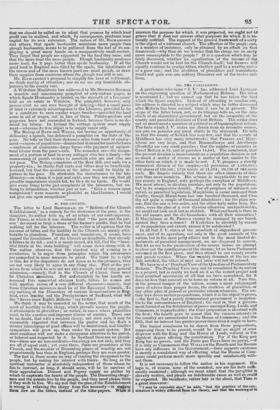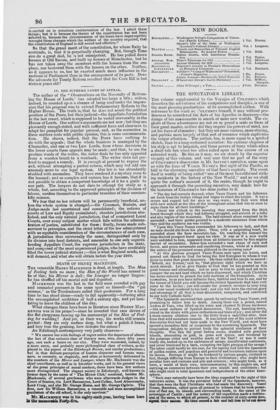III. THE PARLIAMENT.
A gentleman who signs " J. V." has addressed Lord ALTHORP on the engrossing question of Parliamentary Reform. His letter is numbered I.; but we cannot say that he has taken the hint which the figure supplies. Instead of attending to number one, his address is directed to a subject which may be better discussed after Reform has been carried, than it can be at present. The scope of the letter bears, not, as its titlepage tells us, on the mis- chiefs of an oligarchical government, but on the inequality of the county and parochial divisions of Great Britain. . The writer does not so much moot a question of political as of topographical reform. The facts which J. V. states are drawn from no recondite source, nor can we perceive any great ability in the statement. He tells us that the county of Selkirk has very few, and that the county of Middlesex has very many inhabitants ; that Pancras and Mary- lebone are very large, and that Broomsthorpe and Alesthorpe (Norfolk) are very small parishes; that the number of counties in Great Britain is 82, and of parishes 11,641. The conclusion, that the present division is inconvenient, as a population division, is not so much a matter of reason as a matter of fact, similar to the other facts on which it is made to rest. J. V. proposes a strictly numerical division of the empire,-12 provinces of 1,666,66G ; 144 shires of 138,888 ; 1728 wards of 11,574 ; 20,736 of 964 souls each. He forgets entirely that there are other elements of divi- sion than mere numbers. His scheme is inapplicable to any en- tire county in England, with perhaps the exception of Middlesex. We must attend, in dividing parishes, not only to the population, but to its comparative density. For all purposes of national, co- mitial, or parochial legislation, Marylebone is easier managed than Crathy, though Marylebone has one hundred thousand, and Cra- thy not quite a couple of thousand inhabitants ; for the plain rea- son, that the one is two miles, and the other forty miles long. Be- sides, were the plan of a new division otherwise unobjectionable, we could not look on it but as childish. What real harm is there in the old names, and the old boundaries with all their sintiosities ? If Marylebone or St. Pancras cannot be managed by one board, cannot they have a dozen? If Yorkshire be unwieldy by reason of its population and extent, cannot it be subdivided ? In all that J. V. states of the mischiefs of oligarchical govern- ment, and of its operation, not only in the great councils of the nation, but in the most petty affairs and in the most limited de- partments of parochial management, we are disposed to concur. But let us see to the purification of the source before we attempt to clear out the ramifications of the stream ; let us have Parliament reformed in the 'first place, and then attend to our county courts and parish vestries. When the weighty demands of the law are duly satisfied, the tithes of mint and anise will not be refused. • We have next a" Practical View of the Question of Parliamentary Reform." The Practical View may not be considered by its author as a project, but in reality we look on it as the veriest project and least practical speculation of all that we have considered, for it does no less than counsel us to have no reform at all. NoW this; in the present temper of the nation, seems a more extravagant piece of advice than pauper farms, the abolition of pluralities, or any other plan of general or particular reform whatever. The au- thor lays down certain propositions, which it is his Object to prove, —the first is, that a purely democratical government is inapplica- ble to the circumstances of England ; the next is, that a govern. ment founded on the distribution of power amongst King, Lords, and Commons, is impracticable; the third proposition is identical with the first ; the fourth goes to assert that the various interests in the country are concentrated in the House of Commons ; and the fifth, that no interest has 'greater power there than it ought to have.
The logical conclusion to be drawn from these propositions, supposing them to be proved, would be that we might at once dispense with the King and the House of Lords, without in the Slightest degree altering the constitution. For if the King qua King has no power, and the Peers qua Peers have no power,—if it is only as Commoners that WILLIAM the Fourth and his Barons have any influence in the Government,—their separate existence is merely a roundabout way of effecting what the House of Com- mons could perform much more .speedily and satisfactorily with- out them.
It is not necessary to follow the author in his argument. His logic is, of course, none of the soundest, nar are his facts suffi- ciently examined ; although we must admit that -the pamphlet is cleverly written, and pleads an indefensible cause as well as could be expected. He recollects, rather late in the sheet, that Time is a great innovator: " I may be. reminded ii116,4' he adds, "that the praCtice 'of the con-. stitution is widely differeirfrom the' theory,. and. that the Working of it
is carried on in notorious contravention of the law. I admit these things; but it is because the theory of the constitution has not been adhered to, because the circumstances of the times have imperceptibly wrought those changes which the welfare of the country required, that the constitution of England is still sound and effective."
So that the grand merit of the constitution, for whose fixity he contends, is, that it is perpetually changing. But, though Time can do a great deal, he is not omnipotent. He has pulled down houses at ()Id Sarum, and built up houses at Manchester, but he has not taken away the members with the houses from the one place, nor bestowed them with the houses on the other. Neither, as it appears to us, has he exerted much more influence in the motions of Parliament than in the arrangement of its parts. Does the advocate for Timely Reform recollect that the Corn Bill is but sixteen years old?



























 Previous page
Previous page